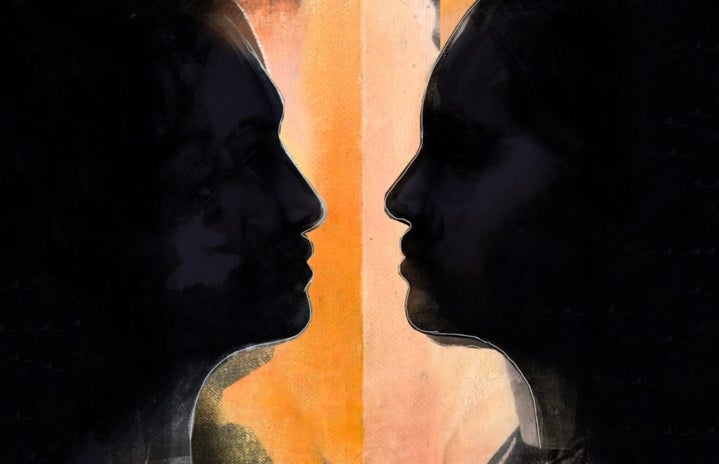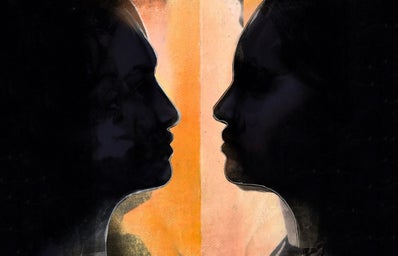One day this past fall, I was endlessly scrolling through my Reels feed on Instagram, watching 3-month-old TikTok trends and almost definitely procrastinating doing homework. In one of the videos, the audio really caught my attention: I had never heard the song before, and it didn’t seem to be very popular because not many other people had used the sound on Instagram. Luckily, I didn’t need to do much digging to figure out what the song was. The creator, @the_eco_cosplayer, had been kind enough to give details in the caption of the video: “Our Word” from 36 Questions. After watching the Reel a few too many times, I hopped on Spotify and listened to the song in full. Although only a clip of the song was used, I was immediately hooked, and that one short video became the beginning of my obsession with 36 Questions, a podcast musical.
Before 36 Questions, I had never heard of a musical in podcast form before. I’ve always been relatively interested in musicals, but my biggest issue with them is their lack of accessibility. If you don’t have the time or money to go see a musical live and it doesn’t get picked for a movie adaptation, you majorly miss out on the experience. You can always listen to the soundtrack, but it’s not quite the same as seeing the intended full production. Thus, the podcast format was extremely exciting and interesting to me. Knowing that I could experience the musical in full, exactly as it was intended, and under the same circumstances as everyone else simply felt really good. On top of my enthusiasm for the accessibility of the musical and knowing I would get the total experience, I was also looking forward to being able to infuse myself into the production more. Without any visuals (no set, costumes, or even visible actors), it was fun to use my imagination to picture the characters and scenes throughout the show. Having to visualize the show as it happened definitely kept me focused throughout the duration of the podcast and I believe also contributed to how deeply I felt the characters’ emotions. Aside from the unique format, it was also just an amazing musical.
The musical consists of three acts, ranging from 45 minutes to about an hour long, written by Ellen Winter and Chris Littler and starring Johnathan Groff and Jessie Shelton as the two main characters Jase and Natalie/Judith. The entire podcast is made to sound like a compilation of voice recordings on Judith’s phone, which is interesting because sometimes parts of the story will be missing where her phone cuts out or she stops recording. The voice memo concept really drives home the idea that the musical was made to be a podcast by imitating another audio-only media format. In general, 36 Questions follows an estranged couple as they rehash their complicated relationship and deal with the aftermath. The heart of the musical is a psychological experiment titled “The Experimental Generation of Interpersonal Closeness: A Procedure and Some Preliminary Findings” by Aron et al., in which strangers answer a series of 36 questions together to essentially determine if doing so will make them fall in love. It’s a real study, and one that has been referenced in many other popular media sources. For example, one night over winter break I realized that an episode of The Big Bang Theory is all about the 36 questions!
In 36 Questions, it is revealed that Jase and Judith asked each other the 36 questions on their first date, and the musical tells of the couple rediscovering each other by working through the 36 questions for a second time after everything about their relationship has changed. I don’t want to spoil all the exciting plot points and twists, so I won’t say much more about the story, but if you’re a hopeless romantic like me then I know what I’ve already said is enough to get you interested. Also, if the psychological experiment part of it intrigues you, the podcast actually asks all 36 questions over the course of the three acts, so you get to think about how you might answer the questions yourself as well.
The first time I listened to 36 Questions, I was so entranced that I listened to all three acts right in a row, no breaks. I couldn’t help it; the story sucks you in and begs you to keep listening. In addition to a plot that hooks you, the songs are also amazing. I want to talk about a few of my favorites, but before I do, I wanted to mention that my suggestion is to listen to the podcast first before listening to the soundtrack. Since it’s a musical, the songs do tell most of the story, but it’s not the same experience and some of the songs give a lot of information about the characters that is more fun to hear for the first time as part of the podcast.
This first song, “One Thing,” is the embodiment of being tense and stressed. It’s the musical equivalent of those days where everything is going wrong, and each new inconvenience that occurs (even if slight) feels like the end of the world. This song is great to listen to when all the little things add up and it’s just too much. As Judith points out in the song, it’s also a song about trying to do things that you have control over in order to cope with other things in life that you can’t control. So if you’re having a bad day that just keeps getting worse, know that you’re not alone, and let it out to “One Thing.”
Next we have “For The Record,” a more playful tune that does a great job of setting up the trajectory of the rest of the musical. There are three parts to the song: one from Jase’s perspective, then one from Judith’s, and finally, the song closes with the pair singing together. Jase’s portion demonstrates how he is a little regretful for entertaining Judith and how he is mostly going into the night determined to get the answers he’s looking for without falling for her again. Judith’s section reveals her hopefulness about their reunion, nervousness about how the night will go, and her stubbornness to tell Jase the truth and win him back. It sums up how the characters feel about each other in a catchy song that for some reason makes me smile and want to dance.
“Our Word” is the deepest dive into Judith’s life that we experience throughout the entire musical. She retells stories of problems from her life before Jase and how her parents taught her to deal with them. It’s honest and raw, tinged with shame and regret. It’s powerful and upsetting, and it’s where you begin to feel for Judith and understand what led the couple to where they are now. This is definitely the song I had in mind when I suggested listening to the whole podcast before the songs alone: in the podcast, it’s a big moment for the couple and reveals a lot about the character, and some of that magic and shock is missing when you already know what Judith will say.
Finally, “Reality” is full of heartbreak and distress. You can tell how torn and distraught Jase is as he sings about his inner battle between wanting to be with Judith and being hurt by her. He goes back and forth between acknowledging his feelings for her and reminding himself of the pain he has suffered through and the lies he has endured. It’s a great song about the difference between reality and the versions of people and events that someone can create in their head. Sometimes, it can be easy to remember only a supercut of the good parts of a relationship and fall back into old habits when the opportunity presents itself. This song reminds you that the truth of what has happened may be painful regardless of your feelings for someone, and you have to keep both in mind when making tough decisions in order to do what you feel is best for yourself. This song is one of my favorites because it’s so emotional and you can really sympathize with Jase the way that the song is sung.
The only bad part of 36 Questions is that it doesn’t really end. Well, you know what I mean. The podcast does end, it doesn’t go on infinitely, but there’s no definite answer as to what happens with the characters at its conclusion. So what I really mean to say is that it doesn’t have a super satisfying ending. Maybe that’s part of the reason why I continue to listen to it: you can go back and listen again to gather and analyze all the details to best decide what you think happens when the podcast ends. My speculation changes each time I listen to it, depending on my mood and what theories I’ve read online. Your personal prediction will likely be affected by your personal balance of hopeless romanticism and skepticism.
Since my very first listen, I have listened to 36 Questions in its entirety more times than I can count. I would call it my comfort podcast, I suppose. Whenever I don’t know what to listen to, or I’m feeling down or sentimental, it’s my go-to. No matter how I go into it, I always end it in a better mood and feeling very full of emotion and life. I hope that I did the musical justice with the way I have written about it in this article; I have so much respect and love for it. There is so much more I could say about it, but I hope you’ll listen for yourself and love it as much as I do (although, admittedly, that would be pretty hard – I’m kind of obsessed). 36 Questions can be found on any platform where you listen to podcasts, as well as at 36questionsmusical.com.
If you would like to write for Her Campus Mount Holyoke, or if you have any questions or comments for us, please email hc.mtholyoke@hercampus.com.


